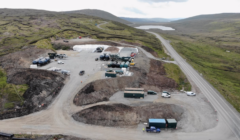Council / Energy strategy to remain as draft for now following vote in council chamber
COUNCILLORS have voted to delay the publication of Shetland’s first energy strategy to allow it to be developed further following a proposal from officers to adopt an “interim” version.
Council officers had said the “information, analysis and projections” in the strategy would need to be revised in the future as a result of the “dynamic” nature of the energy transition, leading to the “interim” tag.
But Shetland Central councillor Moraig Lyall successfully proposed that the document remains a draft in the meantime.
During a recent consultation on a draft version of the strategy the Shetland Net Zero group publicly criticised the report for not going far enough.
The industry body also called for “visionary leadership and decision making” to realise long-lasting advantages of the energy transition for Shetland.
As a result there was concern from some elected members at Wednesday’s meeting of the full Shetland Islands Council (SIC) that there was not enough buy-in from the local industry and that some parts of the strategy needed to be developed further – with a majority backing Lyall’s proposal to hold off adopting the strategy.
It comes against the backdrop of significant future activity in and around Shetland in the move towards net zero.
This includes proposals for future onshore and offshore wind farms and potential hydrogen production.
Earlier this month the National Grid recommended that a second HVDC subsea cable should be laid between Shetland and the Scottish mainland – primarily to allow offshore wind farms to the east of the isles an export route.
Four long-term outcomes feature in the SIC’s energy strategy, including reducing emissions and securing affordable energy.
The other two are creating and retaining local wealth and developing local skills and capacity.
At a meeting of the full council on Wednesday, elected members also agreed to instruct officers to continue to develop the strategy through further research and engagement – but with an amendment that they report back to councillors within six months.
Become a member of Shetland News
They also gave the green light for the SIC’s development director Neil Grant to convene a renewable energy sector engagement forum.
A report to councillors on Wednesday noted how energy transition projects have the “potential for significant economic impact and income generation capacity”.
“The council owns assets which are fundamental components of the current and future energy infrastructure and will have significant decisions to make on land rental and investment decisions,” it added.
“In addition the council will need to make changes to the energy efficiency of properties, review the vehicle fleet to meet net zero along with the charging and refuelling infrastructure.”
One project in particular which relates to the council is the former Scatsta Airport, which is owned by the SIC and which Statkraft plus partners are in negotiations over leasing – with green hydrogen production in the companies’ sights.
Nearby, Sullom Voe Terminal operator EnQuest is also proposing hydrogen production as it looks to diversify the site.
The report to councillors also stressed the importance of environmental protection and the maintenance of biodiversity amid energy transition projects.
“If any large-scale development is progressed in the Sullom Voe area, the expectation would be to align monitoring of activity and environmental impacts with existing best practice environmental protection arrangements such as the Sullom Oil Terminal Environmental Advisory Group (SOTEAG),” it added.
The report also warns of a wider need to change how the energy markets operate.
“The council is also acutely aware of the risks that energy transition could make the current difficulties around the availability of affordable energy in Shetland worse rather than better, if market options and regulations do not address our issues,” it said.
“Households and communities who intrinsically have quite high energy needs in a place like Shetland need to be able to access that energy affordably. That is a particular requirement of Just Transition when that community is a place where enormous amounts of energy are being generated.”
Future energy manager Douglas Irvine said feedback from the consultation on the draft document been considered throughout the process, but there was an understanding than some comments were more complex than others.
And when asked how he envisaged the strategy being developed further, Grant said: “It’s about the Shetland community and it’s about understanding what benefits there are, and how we can maximise those for the Shetland community.”
Chief executive Maggie Sandison also noted how there was no duty to have an energy statutory and said even Aberdeen City Council tended just to let industry get on with things.
She added that councillors would be “letting the community down” if they did not have a strategy in place ahead of likely future energy development in Shetland.
While there was acknowledgement that a high level of work has gone into the energy strategy, some councillors had reservations about a lack of an action plan or ways progress could be monitored.
Scottish Greens’ councillor Alex Armitage encouraged Shetland to evoke the spirit of 1974, when legislation was introduced by the council to reap benefits from the incoming oil boom.
He suggested something similar may need to be done with renewables, adding that Shetland is in the “spotlight” and in demand from energy developers.
However depute leader Gary Robinson said “everyone and their dog” across the world is looking at renewable energy, including hydrogen production.
He also proposed that an interim energy strategy be adopted as it gave an opportunity for things to move forward.
But Lyall said the fact that the strategy was dubbed interim was a “tacit admission” that the report required more work.
She said council officers have been engaging with energy developers for years and a short delay would not impact things.
When it came to a vote Lyall’s motion won by 11 to three.
Become a member of Shetland News
Shetland News is asking its many readers to consider paying for membership to get additional features and services: -
- Remove non-local ads;
- Bookmark posts to read later;
- Exclusive curated weekly newsletter;
- Hide membership messages;
- Comments open for discussion.
If you appreciate what we do and feel strongly about impartial local journalism, then please become a member of Shetland News by either making a single payment, or setting up a monthly, quarterly or yearly subscription.


















































































